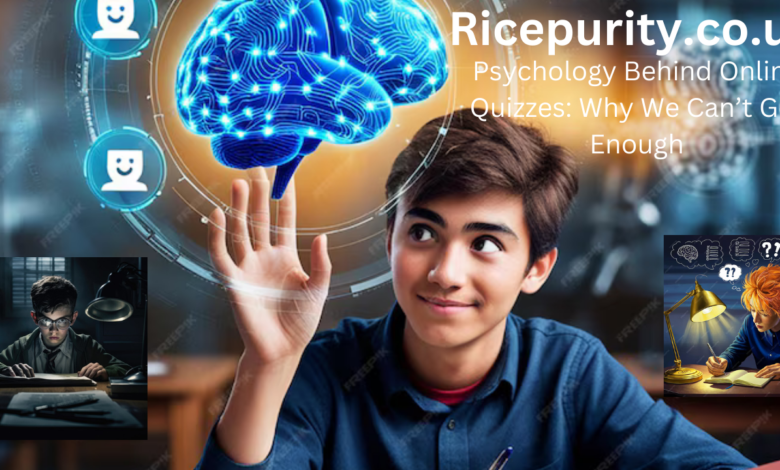The Science of Quiz Addiction What Makes Us Click ‘Start’?

Online quizzes have become a staple of internet culture. Whether it’s discovering your personality type, finding out which movie character you are, or determining what career best suits you, quizzes can be hard to resist. With titles that pique curiosity and instant results, quizzes are not only popular but often addictive. But why exactly are we so drawn to them? The answer lies in a mix of psychology, technology, and a touch of social dynamics. Let’s dive into the science of quiz addiction and why we keep clicking “Start.”
Why Do Quizzes Appeal to Us?
1. The Allure of Self-Discovery
Humans have an innate desire to understand themselves better. Online quizzes promise insights into our personalities, likes, dislikes, and even hidden talents. The notion of self-discovery can be incredibly tempting; quizzes can make us feel like we’re learning something new or validating something about ourselves.
Research in psychology suggests that self-discovery helps us form our identity. This curiosity to learn more about ourselves is known as self-concept clarity, and it drives us to seek validation of our traits and beliefs. By confirming what we already suspect or revealing new aspects about ourselves, quizzes satisfy this need.
2. Immediate Gratification and Dopamine Release
When we click on a quiz, we’re often looking for a quick burst of entertainment. Quizzes are designed to be completed in minutes, offering immediate results. This fast turnaround stimulates the brain’s reward center, triggering dopamine release. Dopamine, often referred to as the “feel-good” neurotransmitter, is associated with pleasure and reward. Every time we take a quiz, we receive an instant gratification boost, which keeps us coming back for more.
The Role of Social Validation
1. Sharing Results for Social Approval
Most quiz platforms encourage sharing results on social media, and many people happily oblige. Sharing quiz results offers a moment for social validation. When friends or followers like, comment, or engage with our results, it affirms our sense of self and satisfies the need for approval.
2. Sense of Belonging and Relatability
Quizzes often group people into categories, such as personality types or styles, creating a sense of community and belonging. When we identify with a particular “type,” we feel connected to others who share similar traits. This experience of relatability and shared identity adds a social layer to the enjoyment of quizzes.
The Psychology of Curiosity
Curiosity, a powerful driver of behavior, plays a significant role in our quiz addiction. Psychologists categorize curiosity into two types:
- Epistemic Curiosity: This involves the desire to acquire knowledge and answers to questions. People take quizzes not only for fun but also to learn about specific aspects of themselves.
- Perceptual Curiosity: This is the fascination with new, surprising, or ambiguous information. Quiz titles like “What’s Your Hidden Talent?” or “Which Celebrity Matches Your Personality?” tap into our perceptual curiosity by offering the possibility of unexpected answers.
This curiosity can feel almost irresistible, especially when quizzes promise insights that are unique or insightful.
How Quiz Design Fuels Engagement
1. Catchy Titles and Compelling Images
The way quizzes are designed is key to their appeal. Titles are crafted to draw attention and spark curiosity. Phrasing like “You Won’t Believe Which Character You Are!” or “Find Out What Career Matches Your Personality” is hard to ignore. Accompanied by eye-catching images, these titles create an emotional response that makes us want to take the quiz right away.
2. Gamification Elements
Quizzes incorporate elements of gamification to make the experience more enjoyable and immersive. Many quizzes are structured as multiple-choice questions with fun visuals, making them feel like a game rather than a test. By providing a low-stakes, interactive experience, quizzes make people feel relaxed and entertained, encouraging them to engage without hesitation.
The Personalization Effect
People are drawn to content that feels personalized or specific to them. Quiz creators use broad, relatable statements that can apply to a wide range of people but feel uniquely accurate when we read them. This phenomenon, known as the Barnum Effect, is common in horoscopes and personality quizzes. By crafting statements that sound personal but are actually universal, quizzes can make us feel as though the results are tailor-made for us.
The Risks of Quiz Addiction
While quizzes may seem harmless, overindulgence can lead to negative effects, including:
- Dependence on External Validation: Constantly seeking affirmation through quiz results can lead to dependence on external validation, reducing self-confidence over time.
- Privacy Concerns: Many quizzes require access to personal data, such as social media profiles, to give more “accurate” results. This data can be used for targeted advertising or even sold to third parties, compromising privacy.
- Over-reliance on Labels: Assigning oneself a “type” or “category” based on quiz results can sometimes limit personal growth. If you start viewing yourself only through these fixed labels, you may miss opportunities for self-improvement outside these frameworks.
Embracing Quizzes in a Balanced Way
Quizzes can be entertaining and insightful when approached with a balanced mindset. Here are some tips for getting the most out of your quiz experience without letting it become addictive:
- Take Results with a Grain of Salt: Remember that quizzes are just one perspective on your personality or preferences.
- Prioritize Self-Reflection: Instead of relying solely on quizzes for self-discovery, take time to reflect on your thoughts, feelings, and experiences.
- Set Boundaries: Limit your time spent on quizzes and recognize when you’re taking them out of habit rather than curiosity or fun.
Conclusion
Quizzes are an entertaining part of modern internet culture, drawing us in with promises of self-discovery, instant gratification, and social validation. By understanding the psychological drivers behind quiz addiction, we can enjoy them in a mindful and balanced way. Embrace quizzes as a fun activity, but remember they’re just one small piece of the journey to understanding yourself.



